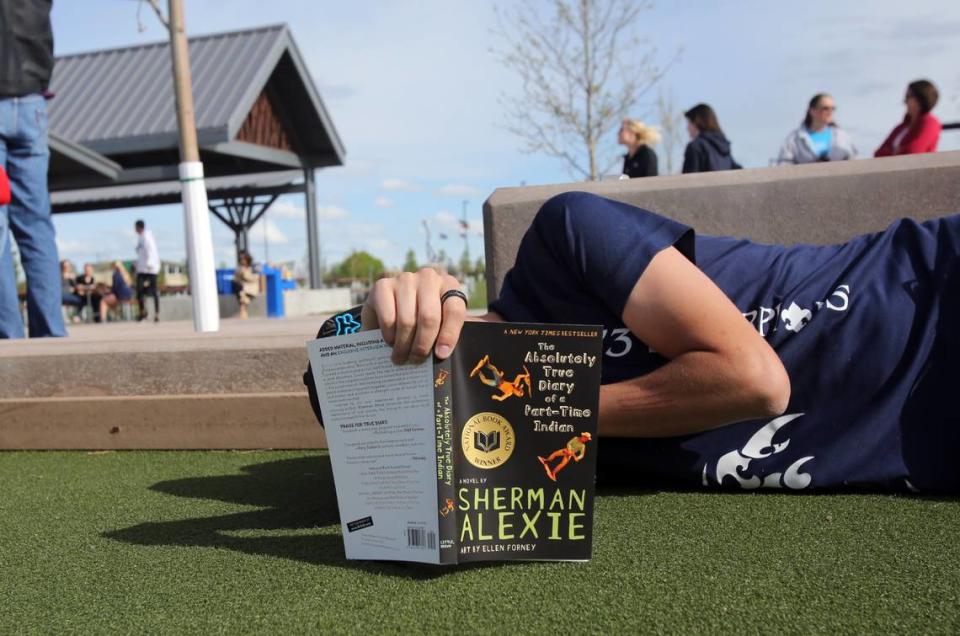Wake schools have new rules for selecting instructional material. Some are not happy.
Tensions over what books should be allowed in Wake County schools flared up as new rules were adopted over how instructional materials are selected and read aloud in class.
The Wake County school board voted 7-2 on Tuesday to approve policy revisions that say instructional materials should not be “pervasively vulgar” and that teachers should consult with other school staff before material is read aloud in class. Most board members said it strikes a good balance between parental and teacher concerns.
“We want to honor what parents believe is best for their child,” said school board chair Lindsay Mahaffey. “But we also have to honor what our educators believe has an educational relevance to their classroom.”
Board members Cheryl Caulfield and Wing Ng voted no, saying the policy doesn’t go far enough to define what books should not be allowed in schools. They advocated steps such as adopting a rating system.
“If I were to have a child be able to access this kind of material that they’re not ready for, I have to answer not to my wife, I have to answer to a higher power,” Ng said.
“In good conscience, I can not allow this to be accessible when it’s not appropriate for their age group.”

Pervasively vulgar
Wake’s updated policy on selection of instructional material says it should not be “pervasively vulgar.” The wording is taken from the state law on book challenges.
The term “pervasively vulgar” is not defined in the policy or in a related policy being developed to handle book challenges.
The policy also adds a new section on read alouds. The policy says materials selected for read alouds will be made by teachers “in collaboration with other school staff.”
In addition to not being “pervasively vulgar,” teachers should consider:
▪ ”The needs, age, and maturity level of the students in the classroom.”
▪ ”The fact that additional care and discretion is required for selecting materials to be read aloud to a captive classroom audience as opposed to a voluntary reading selection by students.”
▪ ”The teacher should first independently read the text as a whole before selecting a text or passage for read aloud.”
The policy adds that principals have the power to discontinue having a text read aloud at their school.
‘This is not educational material’
The policy update comes at time when what books are allowed in schools has become part of the national school culture wars.
Over the past two years, people have brought at least 189 book challenges across North Carolina’s 115 public school districts, journalists from nine state newsrooms learned by surveying the districts as part of Sunshine Week. Books on race and sexuality were among the most targeted.
In December 2021, a group of parents and community activists filed criminal complaints accusing the Wake County school system of violating obscenity laws based on some of the books in school libraries. Wake County District Attorney Lorrin Freeman announced she would not file criminal charges.
Speakers now regularly show up at Wake school board meetings reading excerpts from books that they say should be removed from schools due to their sexual content and language. They’ve read from books such as “Jack of Hearts,” “The Absolutely True Diary of a Part-Time Indian” and “Lawn Boy.”
Caulfield said she’s been uncomfortable hearing the passages.
“You’re talking about sexual positions,” Caulfield said. “You’re about how to perform sexual acts.
“This is not educational material, and the more that I start diving into these books, the more I see what people are really complaining about.”
‘Small percentage’ are complaining
But school board member Sam Hershey said it’s the responsibility of parents to talk with their children about what books to read. He said it’s not the fault of anyone on the board or in the district what students check out of the school library.
“Let’s be clear,” Hershey said. “A very small percentage of people have problems with some of these books and I respect that they share their opinion here. That is great.
“That is part of the process and if we have a rating system for some of them, fine. But this idea that we’re going to get rid of them, no.”
Mahaffey, the board chair, said the books read at meetings have been only found in some school libraries and are not part of required classroom reading. She also said schools will provide alternative reading assignments for any material parents don’t want children to read.
“No one book can be judged by a sentence within that book,” Mahaffey said.
Board member Lynn Edmonds said speakers have only been reading “salacious” excerpts.
“There are families in this school district that would not be bothered of their children having access to those books, and they are our families, too,” Edmonds said. “Those are our students, too. Those are our parents, too.
“So it is not appropriate for me to decide what, Cheryl (Caufield), you and your husband choose for your children. It’s not appropriate for me to tell you what they should and shouldn’t read and have access to.”

